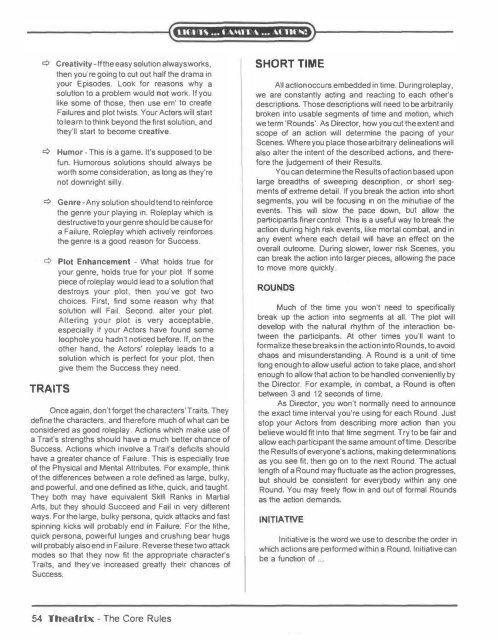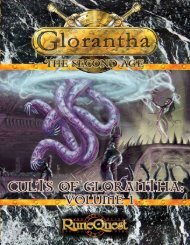Untitled - Index of - Free
Untitled - Index of - Free
Untitled - Index of - Free
You also want an ePaper? Increase the reach of your titles
YUMPU automatically turns print PDFs into web optimized ePapers that Google loves.
1:0 Creativity -If the easy solution always works,<br />
then you're going to cut out half the drama in<br />
your Episodes. Look for reasons why a<br />
solution to a problem would not work. If you<br />
like some <strong>of</strong> those, then use em' to create<br />
Failures and plot twists Your Actors will start<br />
to learn to think beyond the first solution, and<br />
they'll start to become creative.<br />
1:0 Humor- Th1s 1s a game. It's supposed to be<br />
fun. Humorous solutions should always be<br />
worth some consideration, as long as they're<br />
not downright silly<br />
Genre-Any solution should tend to reinforce<br />
the genre your playing in. Roleplay which Is<br />
destructive to your genre should be cause for<br />
a Failure. Roleplay which actively reinforces<br />
the genre is a good reason for Success.<br />
1:0 Plot Enhancement - What holds true for<br />
TRAITS<br />
your genre, holds true for your plot If some<br />
piece <strong>of</strong> roleplay would lead to a solution that<br />
destroys your plot, then you've got two<br />
choices. First, find some reason why that<br />
solution will Fa1L Second, alter your plot.<br />
Altering your plot Is very acceptable,<br />
especially if your Actors have found some<br />
loophole you hadn't noticed before. If, on the<br />
other hand, the Actors' roleplay leads to a<br />
solution which is perfect for your plot, then<br />
give them the Success they need<br />
Once again, don't forget the characters' Traits. They<br />
define the characters, and therefore much <strong>of</strong> what can be<br />
considered as good roleplay Actions which make use <strong>of</strong><br />
a Trait's strengths should have a much better chance <strong>of</strong><br />
Success. Actions which involve a Trait's deficits should<br />
have a greater chance <strong>of</strong> Failure This is especially true<br />
<strong>of</strong> the Physical and Mental Attributes. For example, think<br />
<strong>of</strong>the differences between a role defined as large, bulky,<br />
and powerful, and one defined as lithe, quick, and taught<br />
They both may have equ1valent Skill Ranks in Martial<br />
Arts, but they should Succeed and Fail in very different<br />
ways. For the large, bulky persona, quick attacks and fast<br />
spinning kicks will probably end m Failure. For the lithe,<br />
quick persona, powerful lunges and crushing bear hugs<br />
will probably also end in Failure Reverse these two attack<br />
modes so that they now fit the appropriate character's<br />
Tra1ts, and they've tncreased greatly their chances <strong>of</strong><br />
Success.<br />
54 Theat..-lx- The Core Rules<br />
SHORT TIME<br />
All action occurs embedded in time. During roleplay,<br />
we are constantly acting and reacting to each other's<br />
descnptions. Those descriptions will need to be arbitrarily<br />
broken into usable segments <strong>of</strong> time and motion, which<br />
we term 'Rounds' As Director, how you cut the extent and<br />
scope <strong>of</strong> an action will determine the pacing <strong>of</strong> your<br />
Scenes. Where you place those arbitrary delineations will<br />
also alter the intent <strong>of</strong> the described actions. and there<br />
fore the judgement <strong>of</strong> their Results.<br />
You can determine the Results <strong>of</strong> action based upon<br />
large breadths <strong>of</strong> sweeping description or short seg<br />
ments <strong>of</strong> extreme detail. If you break the action into short<br />
segments, you will be focusing in on the minutiae <strong>of</strong> the<br />
events. This will slow the pace down, but allow the<br />
participants finer control. This is a useful way to break the<br />
action during high risk events, hke mortal combat, and in<br />
any event where each detail will have an effect on the<br />
overall outcome. During slower, lower nsk Scenes, you<br />
can break the action into larger pieces, allow1ng the pace<br />
to move more quickly<br />
ROUNDS<br />
Much <strong>of</strong> the time you won't need to specifically<br />
break up the action Into segments at all. The plot will<br />
develop with the natural rhythm <strong>of</strong> the interaction be<br />
tween the participants. At other times you'll want to<br />
formalize these breaks in the action into Rounds, to avoid<br />
chaos and misunderstanding. A Round is a unit <strong>of</strong> t1me<br />
long enough to allow useful action to take place, and short<br />
enough to allow that action to be handled conven1ently by<br />
the Director. For example, 1n combat, a Round 1s <strong>of</strong>ten<br />
between 3 and 12 seconds <strong>of</strong> time.<br />
As Director, you won't normally need to announce<br />
the exact time interval you're using for each Round Just<br />
stop your Actors from describing more action than you<br />
believe would fit into that time segment Try to be fair and<br />
allow each participant the same amount <strong>of</strong> hme. Describe<br />
the Results <strong>of</strong> everyone's act1ons, making determinations<br />
as you see fit, then go on to the next Round. The actual<br />
length <strong>of</strong> a Round may fluctuate as the action progresses,<br />
but should be consistent for everybody within any one<br />
Round. You may freely flow in and out <strong>of</strong> formal Rounds<br />
as the action demands.<br />
INITIATIVE<br />
Initiative is the word we use to describe the order in<br />
which actions are performed Within a Round. Initiative can<br />
be a function <strong>of</strong> ..



